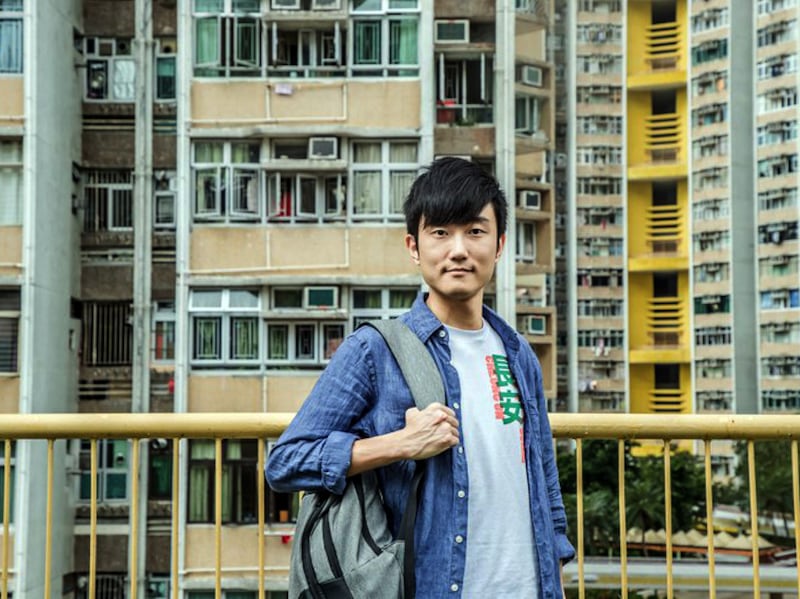Hong Kong is sending district councilors and other local officials to mainland China to learn how the ruling Chinese Communist Party uses local networks of volunteers to monitor the population and target potential unrest before it happens.
China’s “red armband” brigade of state-sanctioned busybodies have been dubbed the biggest intelligence network on the planet by social media users, and have supplied information that has also led police to crack major organized crime, according to state media.
Neighborhood committees in China have long been tasked with monitoring the activities of ordinary people in urban areas, while its grid management system turbo-charges the capacity of officials even in rural areas to monitor what local people are doing, saying and thinking.
These local forms of surveillance and social control are known in Chinese political jargon as the “Fengqiao Experience.”
Now, it looks as if Hong Kong will be adopting similar measures, according to the city’s Secretary for Home and Youth Affairs, Alice Mak, who confirmed that 18 local officials had already been to the eastern province of Zhejiang to study the system.
“Through classroom study and on-the-spot understanding of the practical methods of the Fengqiao Experience ... district councilors understand that regional governance requires strengthening communication with citizens, understanding their emergencies, difficulties and worries, as well as the early detection and resolution of citizens’ problems,” Mak told the Legislative Council on Wednesday.
She said the Fengqiao Experience will be implemented in Hong Kong by newly introduced “care teams,” and that further training is in the pipeline.

In July 2021, China empowered local officials at township, village and neighborhood level to enforce the law, as well as operating a vastly extended “grid management” system of social control in rural and urban areas alike.
According to directives sent out in 2018, the grid system carves up neighborhoods into a grid pattern with 15-20 households per square, with each grid given a dedicated monitor who reports back on residents' affairs to local committees.
Hong Kong’s care teams are also expected to help the authorities inform the public, as well as reporting the views of the public to the government, according to a 2022 document announcing their deployment.
Detecting grievances
Current affairs commentator Johnny Lau said the ongoing crackdown on public dissent under two national security laws isn’t enough for the authorities, who want to nip any signs of potential unrest in the bud.
“The authorities are taking the big-picture view that there will be a lot of public grievances given the current economic problems,” Lau told RFA Cantonese in a recent interview. “It’s clear that more grassroots work will have to be done to prevent any outbreak of such grievances.”
He said the District Councils, which now contain only members judged “patriotic” following recent changes in the electoral system, will be the mainstay of the new approach, with the care teams staying in touch with local residents in neighborhoods.
But he said there are also plenty of technological options for keeping an eye on what people are up to.
RELATED STORIES
Innocent-sounding ‘care teams’ spark fears of heightened surveillance in Hong Kong
China recruits thousands to monitor its citizens' words and deeds
China moves ahead with ‘mass policing’ plan for local communities
Former pro-democracy District Councilor Cheung Man-lung said the care teams won’t necessarily be effective if people don’t trust them, however.
“Community work is always based on public trust in those in positions of responsibility,” Cheung said. “If people don’t trust them, then there’ll be a lot of problems [with this approach].”
Cheung said he hasn’t seen much of his local care team, despite the bursting of a water main in his neighborhood recently.
Chief Executive John Lee, who was “elected” unopposed following changes to the electoral rules in 2022, first announced the establishment of care teams in his October policy address of that year, saying they would “take part in community-building” across Hong Kong’s 18 districts.
The government would carve up districts into sub-districts, and seek to engage local organizations and groups, including young people and ethnic minorities to take part in community building, he said.
The first care teams, chosen for their patriotism and willingness to follow the government’s lead, were deployed in Tsuen Wan and Southern districts in 2023.
The government changed the rules governing District Council election after the 2019 poll resulted in a landslide victory for pro-democracy candidates that was widely seen as a ringing public endorsement for the pro-democracy movement despite months of disruption and clashes.
Translated by Luisetta Mudie.
